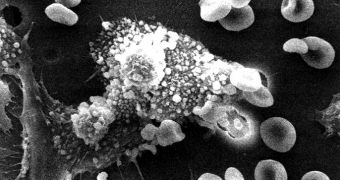A group of British investigators has recently determined that specific strands of human DNA (deoxyribonucleic acid) tend to act against their “owner” when viruses invade, helping the pathogens instead. Through this mechanism, the viral agents can infect a host more readily and with ease, thus setting the foundation for diseases that can ultimately lead to a wide array of forms of cancer. The finding was made by a team of experts at the university College London (UCL).
Upon infecting the body, and the individual cells implicitly, some viruses appear to be able to exploit various strands of DNA to their own benefit, essentially turning off their antiviral immune response. When this happens, the pathogen basically paints itself as a friend, and the body's defense systems will not get activated to fight it. The virus naturally finds it a lot easier to replicate without various types of immune cells eating away at it, and so it spreads through the body a lot faster than it would have otherwise. The new investigation was sponsored by Cancer Research UK.
The UCL team looked first at the Kaposi sarcoma herpesvirus, the main source of the Kaposi Sarcoma type of cancer, and then at the herpes simplex virus, which produces cold sores. The scientists noticed that the viral agents released microRNA when infecting the cells, which are basically very small pieces of genetic material that can also be found in human cells. When our cells detect these molecules, they become a lot more susceptible to infection, in spite of the defense mechanisms the immune system has set up against invaders.
“We are investigating microRNAs as future therapeutic targets, and targeting cellular microRNAs could be a potential way to prevent or treat cancer-causing infection from viruses,” says Chris Boshoff, the director of the Cancer Institute at UCL and a professor of cancer medicine at Cancer Research UK. He is also the lead author of the new investigation, which is detailed in the April 26 issue of the esteemed scientific publication Nature Cell Biology, PhysOrg reports.
“The viruses we tested have evolved with humans for millions of years and use a variety of biological tricks to establish life-long and mostly harmless infections. We discovered that it is likely that other viruses – which can cause diseases including cancer exploit the tiny molecules present in everyone’s DNA – called microRNA – to turn cells into a viral ‘hotel’ which they can check into – to cause infection – and spread,” adds the author of the new paper, Dr Dimitris Lagos. He is based at the UCL Cancer Institute.

 14 DAY TRIAL //
14 DAY TRIAL //